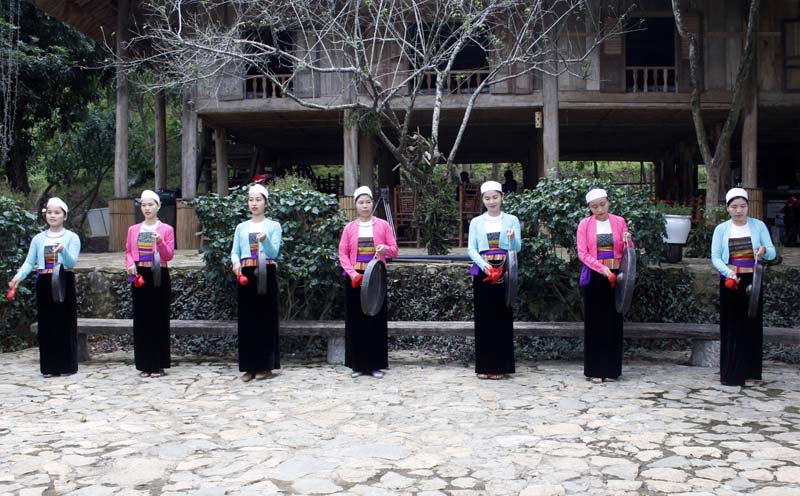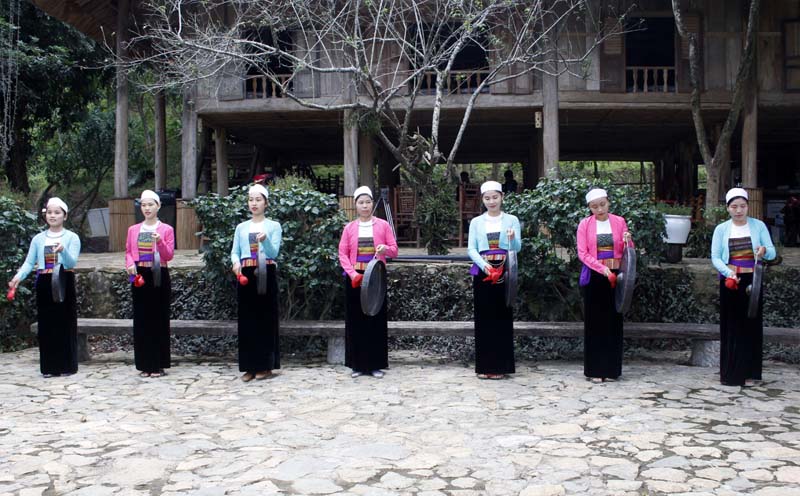
HBO – For members of the Muong ethnic minority group, gongs are a valuable treasure and the soul of the region. They are preserved in every house and used in many major events in Hoa Binh province. In most of the cases, festivals are not started until the gongs sound.

Gong team in Ngoi hamlet, Ngoi Hoa commune,
Tan Lac district rehearses before participating in a team to pay Tet visits to local
households.
The
Muong ethnic group has 37 big festivals, of which 26 use gongs. Gong
performances have left deep impressions on locals and tourists. Gongs are
descended from one generation to another. Preserving ancient gongs and gong
performances is an important mission of every Muong ethnic. At present, the
province has more than 10,000 gongs.
Some
districts pioneered opening classes and inviting artisans to teach how to beat
gongs such as Kim Boi, Lac Son and Tan Lac. Each class has about 30
participants. In addition, to preserve the value of Muong gongs, local authorities
have stepped up disseminations, and encouraged and supported locals to develop
amateur art movements, thus attracting the participation of more than 2,000
locals who work as farmers, artists and communicators to make traditional gong
performances of the Muong ethnic group, contributing to the maintenance of the
sound of gongs.
During
the New Year festival, in each home, gongs are beaten to invite ancestors to return
home for Tet. The sound of gongs, combined with "sac bua” singing, heats up the
festive atmosphere. Normally, each gong team has 12 gongs symbolizing the 12
months in a year and is called a "Phuong bua”. Each "Phuong bua” is headed by
an old person called "trum phuong” who is an expert in gong types and knows
numerous Muong folk songs.
According
to the custom, "Phuong bua” plays gongs in its procession, visits each
household, and sings a song to wish the host prosperity. "Phuong bua” paying
Tet visits must be experts in gong beating. Girls must wear traditional
costumes of the Muong ethnic group. Gong performances used on this occasion are
cheerful and suitable for the spring atmosphere. An important thing is that
members of the gong team must have radiant faces and be well-spoken. When they
concentrate on gong beating, the sound will be attractive and pervasive,
according to Bui Thi Bach Kim in Cao Phong district’s Xuan Phong commune.
In
addition, the sound of the gong is a signal to open the region’s festival./.
With an increasingly vibrant and widespread emulation movement aimed at building cultured residential areas and cultured families, Yen Thuy District has been making steady progress toward improving both the material and spiritual well-being of its people, while fostering a civilized, prosperous, beautiful, and progressive community.
Once lacking recreational spaces and community facilities, Residential Group 2 in Quynh Lam Ward (Hoa Binh City) has recently received attention for the construction of a new, spacious, and fully equipped cultural house. The project followed the model of state support combined with public contributions in both labor and funding.
The "All people unite to build cultural life" movement, which has been effectively integrated with Kim Boi district’s socio-economic development goals, is fostering a lively spirit of emulation across local residential areas, hamlets, villages, public agencies, and enterprises. In addition, through the initiative, traditional cultural values are being preserved and promoted, while community solidarity and mutual support in poverty reduction and economic development are being strengthened.
A working delegation of the Hoa Binh provincial People’s Committee led by its Permanent Vice Chairman Nguyen Van Toan on June 11 inspected the progress of a project to build the Mo Muong Cultural Heritage Conservation Space linked to tourism services in Hop Phong commune, Cao Phong district.
Born and growing in the heroic land of Muong Dong, Dinh Thi Kieu Dung, a resident in Bo town of Kim Boi district, in her childhood was nurtured by the sweet lullabies of her grandmother and mother. These melodies deeply imprinted on her soul, becoming an inseparable part of her love for her ethnic group's culture. For over 20 years, this love for her hometown has driven Dung to research, collect, and pass down the cultural values of the Muong people to future generations.
In the final days of May, the Ethnic Art Troupe of Hoa Binh Province organized performances to serve the people in remote, mountainous, and particularly disadvantaged areas within the province. These were not just ordinary artistic shows, but they were the meaningful journeys aimed at spreading cultural values, enhancing the spiritual life of the people and contributing to the preservation of ethnic minority cultural identities.



